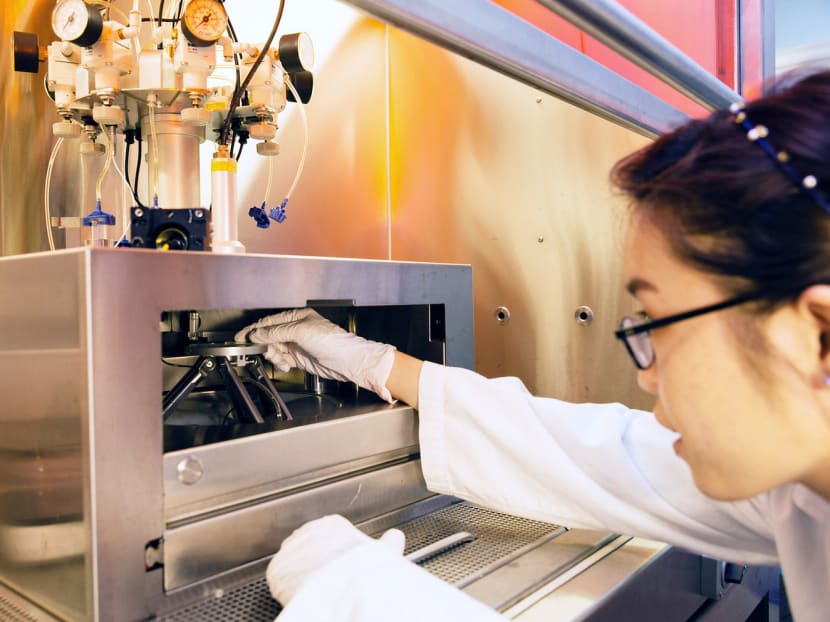National cluster helps firms tap new 3D bioprinting tech
SINGAPORE — Tissue implants customised for individual patients could soon be produced using a new mobile 3D printer under joint development by Nanyang Technological University (NTU) and homegrown start-up Structo.

NTU researcher Lee Jia Min working on the 3D bioprinting of blood vessels, which could potentially be customised according to individual patients to aid in the regeneration of particular tissues. PHOTO: NTU
SINGAPORE — Tissue implants customised for individual patients could soon be produced using a new mobile 3D printer under joint development by Nanyang Technological University (NTU) and homegrown start-up Structo.
The partners are developing a desktop-based 3D-bioprinting system, which allows it to be deployed in any clean room or cell culture room.
It prints the supporting structure layer by layer, and inserts living cells within to aid in the regeneration of particular tissues.
Since it does not require a specialised facility and is easier to operate, it will lower the barriers to market in the bioprinting technology field, said Assistant Prof Yeong Wai Yee, the scientist leading the project. She is the Aerospace & Defence Programme director at NTU’s Singapore Centre for 3D Printing.
This research tie-up is one of several partnerships under the National Additive Manufacturing Innovation Cluster (Namic), which was officially launched yesterday. The formation of Namic was announced in September 2015 with the National Research Foundation Singapore and enterprise development agency Spring helping companies develop capabilities in 3D printing. The cluster’s three founding members are NTU, the National University of Singapore, and the Singapore University of Technology and Design.
Since its formation, Namic has reached out to about 400 local and international companies to help them adopt additive manufacturing (AM), which includes 3D printing, as part of their business. The national cluster has successfully established joint funding for 39 projects between companies and academic institutions, and has 80 more projects in the pipeline.
At the launch yesterday, Mr Loh Khum Yean, Permanent Secretary, Ministry of Trade and Industry (Industry), noted that the nature of manufacturing is evolving with the emergence of new technologies such as AM.
“AM encompasses a range of technologies and applications, of which one of the most commonly known is 3D printing … The 2016 Gartner annual report predicts that by 2020, 75 per cent of manufacturing operations worldwide will be using 3D-printed tools, jigs and fixtures to produce finished goods,” Mr Loh said.
To ensure that the manufacturing sector — which contributes to about one-fifth of the Singapore economy — remains competitive, the Republic will continue to invest in advanced manufacturing technologies, encourage public-private partnerships, and develop its workforce, he added.
The Committee on the Future Economy (CFE) has identified advanced manufacturing as a growth area for Singapore, said Mr Loh.
“Bioprinting is a new research field. It is still in the research phase and is not used in humans now. The latest advancement sees the use of bioprinted human-based micro-tissue as a 3D cell culture system for drug testing. Such testing allows more accurate prediction of human responses compared to normal 2D cell cultures or even animal models,” said Prof Yeong.
Still, it may not be too long before bioengineers start printing skin.
“In terms of technical knowledge, printing skin could be two to three years away as the tissue is relatively simple compared to other tissues. That is provided we have regulatory approval,” Prof Yeong added.





